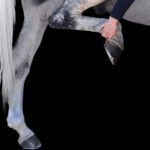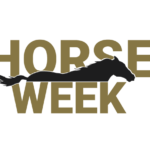
June 28, 2009 — Pfizer Animal Health and American Horse Publications (AHP) presented Charlotte Brailey Kneeland with the eighth annual Equine Industry Vision Award at a ceremonial breakfast held June 26 during the AHP 2009 Free Rein in the Big Easy seminar in New Orleans, La. Established in 2002, the Equine Industry Vision Award was the first of its kind to showcase innovation and recognize ingenuity and service across the entire equine market.
Kneeland earned this honor for her vision to promote and certify riding instructors across the United States. Best known as the founder and director of the American Riding Instructors Association, Kneeland is a true leader who has set an exemplary standard in safety, good teaching practices and professionalism across the horse industry.
“Charlotte Kneeland is an outstanding example of the innovation, vision and leadership that the Equine Industry Vision Award serves to recognize,” said Kristin Ruff, Senior Marketing Manager at Pfizer Animal Health. “Her insight to start an organization for riding instructors has helped raise the bar in safety, education and integrity across all equestrian sports.”
Kneeland was born in Franklin, N.H., on October 23, 1941, to Freeman Brailey and Grace Crossman Brailey. Grace was a legal secretary while her father, Freeman, worked full-time on the Boston and Maine Railroad as a diesel mechanic, and part-time as a New Hampshire state policeman and marine patrol officer. He also owned and operated Merrimack Bay Airpark, a grass landing strip and flying school where many people learned to fly after World War II. Kneeland also has two younger sisters, Janet and Joan.
It was her father who first introduced Kneeland to horses. He would lift her up onto the back of her grandfather’s work horse, Babe, as she plowed the fields. It was also Freeman who bought Kneeland her first horse when she was about 10 years old.
“What a thrill–the most exciting day of my life!” she said.
Strong values and work ethic were introduced to Kneeland from very early on. Her mother instilled in her the confidence that she could be anything in that world that she wanted to be if she just worked hard enough. Grace Brailey also stressed hard work in school, and to “always do a little more than what you have to.”
“My mother would often say, ‘If you’re feeling down, go out and do something nice for someone else,'” said Charlotte. “She was right–it always worked!”
Kneeland attended the University of New Hampshire where she was an English major. She especially loved the school’s riding stable where she got her first real riding instruction. She worked several jobs during her freshmen year. By the end of that year, the school and Kneeland mutually decided that she would be better off out in the real world, putting some of her ideas to work.
One of her many part-time jobs in the early years was buying old saddles that had seen better days, and scrubbing at them for hours until they gleamed, and then reselling them for profit.
“One time a derelict side-saddle showed up,” she said. “After it was polished, I advertised it and was besieged by calls. Ah, I saw an opportunity! I started buying up more old side-saddles, re-selling them, and after finding a contact in Great Britain, starting importing them as well.”
Her side-saddle business led her to realize that while lots of people were interested in this elegant, but pass? style of riding, they didn’t have the knowledge to do it properly, and neither did she. She made it her business to find some of the best, most knowledgeable people in the world: Katherine Illoway, Hope Scott and Mrs. Miles Valentine in the United State, Rosamund Owen in Great Britain, and Lida Fleitmann Bloodgood in Italy. While her co-workers at the telephone company business office spent their coffee breaks and lunch hours relaxing, Charlotte was on the phone, taking notes from these marvelous ladies who had a wealth of knowledge to share. This information became the basis of The International Side-Saddle Organization (ISSO) and Side-Saddle News (SSN), a monthly magazine Kneeland edited and published in March of 1974, and continued until January, 1996, when ISSO and SSN and the shop, The Side-Saddlery, were sold and turned over to new hands.
The side-saddle business led Kneeland to planning and running side-saddle clinics, horse shows and several Presidential Inaugural parade appearances. She planned and ran The National Side-Saddle Horse Show, an Annual Awards program for ISSO, and wrote the book Side-Saddle Riding for Beginners. Then a Judge/Instructor Certification Program was developed and implemented with good results.
Kneeland took what she learned from doing ISSO and plunged into a new venture–The American Riding Instructors Association (ARIA) and The American Riding Instructors Certification Program (ARICP), running all the businesses and both magazines, together from 1984 through 1995.
Kneeland has received other honors throughout her career including the 1987 Governor’s Trophy for the New Jersey Horse Person of the Year. In 2000, she was named to Practical Horseman magazine’s “The PracHorse 100: 20th Century Salutes the Greats who Shaped our Sport.” However, her most touching rewards are the letters she has received from grateful instructors, who’ve told her that ARIA’s emphasis on wearing approved helmets saved a life–more than once it was a student’s, and for two instructors, it was their own.
“Receiving this award is my crowning achievement. It recognizes the philosophy of innovation–not imitation–that I hold dear,” said Kneeland. “It tells me that the creative work of my mind and the physical labor of my body over the last 35 years meant something and has importance.”
The other finalists for this year’s Equine Industry Vision Award included the Certified Horsemanship Association, Equestrian Land Conservation Resource and John Nicholson, executive director of the Kentucky Horse Park.





